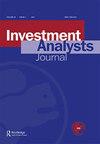跟踪错误波动性和相关风险预算
IF 2.2
4区 经济学
Q3 BUSINESS, FINANCE
引用次数: 0
摘要
摘要本文采用1991-2022年美国积极管理型股票共同基金的汇总横截面样本,表明跟踪误差波动率(TEV)具有回归特征。TEV相对高(低)的共同基金在后续阶段有降低(增加)TEV的趋势,这种逆转的程度取决于TEV相对高或低的程度。这表明TEV是随时间管理的,以满足相对的风险预算。本文还表明,即使考虑到绩效和TEV的变化可能由TEV水平共同决定,以往文献关于共同基金的TEV随着业绩下降而增加的结论仍然成立。结果是稳健的各种测量周期和方法。本文章由计算机程序翻译,如有差异,请以英文原文为准。
Tracking error volatility and relative risk budgets
ABSTRACT This paper uses a pooled cross-sectional sample of actively managed US equity mutual funds from 1991–2022 to show that tracking error volatility (TEV) is characterised by reversion. Mutual funds with relatively high (low) TEV tend to reduce (increase) their TEV in subsequent periods, and the degree of reversion is determined by the degree to which TEV is relatively high or low. This suggests that TEV is managed over time to satisfy relative risk budgets. This paper also shows that the previous literature’s finding that mutual funds increase their TEV as their performance declines holds even when taking into consideration that both performance and change in TEV may be jointly determined by TEV level. The results are robust to a variety of measurement periods and methodologies.
求助全文
通过发布文献求助,成功后即可免费获取论文全文。
去求助
来源期刊

Investment Analysts Journal
BUSINESS, FINANCE-
CiteScore
1.90
自引率
11.10%
发文量
22
期刊介绍:
The Investment Analysts Journal is an international, peer-reviewed journal, publishing high-quality, original research three times a year. The journal publishes significant new research in finance and investments and seeks to establish a balance between theoretical and empirical studies. Papers written in any areas of finance, investment, accounting and economics will be considered for publication. All contributions are welcome but are subject to an objective selection procedure to ensure that published articles answer the criteria of scientific objectivity, importance and replicability. Readability and good writing style are important. No articles which have been published or are under review elsewhere will be considered. All submitted manuscripts are subject to initial appraisal by the Editor, and, if found suitable for further consideration, to peer review by independent, anonymous expert referees. All peer review is double blind and submission is via email. Accepted papers will then pass through originality checking software. The editors reserve the right to make the final decision with respect to publication.
 求助内容:
求助内容: 应助结果提醒方式:
应助结果提醒方式:


